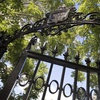{shortcode-2a659564e573ff1f4d4813d34307b2a534bfa3c7}
After more than a week of escalating tariffs on the United States’ closest allies and adversaries alike, Harvard economists warned that President Donald Trump’s economic policy would plunge the country into a recession.
Former Treasury Secretary Lawrence H. Summers, also a former Harvard president, described the tariffs — which represent the highest tariff hike since the 1930s — as “the biggest U.S. economic policy mistake since the Second World War” and a “self-inflicted supply shock.”
“The past market crashes were associated with the pandemic, with financial crises, not consciously chosen presidential policy,” Summers said in an interview with The Crimson.
Trump suddenly paused many of the newly-imposed retaliatory tariffs Wednesday afternoon, following the largest single-week stock market hit since March 2020. The pause will not extend to China, which now faces 125 percent tariffs on all imported goods to the U.S.
In a post on X following the announcement, Summers said much of the economic damage had been done by a hit to American credibility, after several trade partners doubled down on retaliatory tariffs instead of negotiating with Trump.
“Bullies back down,” Summers wrote on Wednesday. “It is tragic to see the United States following banana republic policy approaches and market patterns.”
“The Administration was crowing over the weekend about all the countries that wanted to talk. No postponement then. Now they are rightly scared after collapsing markets,” he added. “Reckless improvisation not a strategy and total dishonesty about what is driving them.”
But when asked by reporters to explain the sudden pause, Trump said it was because people had begun to be too fearful.
“I thought that people were jumping a little bit out of line,” he said at a White House press conference. “They were getting yippy.”
Harvard Economics professor N. Gregory Mankiw, also a former chairman of the President’s Council of Economic Advisors, said the Wednesday announcement of sweeping tariffs was “nothing short of economic malpractice.”
Mankiw said Trump appeared to be operating under the assumption that any bilateral trade deficit meant the U.S. was at a disadvantage. “That’s just inconsistent with basic economics,” he said.
He also said the White House should not see foreign manufacturing as a barrier to domestic economic growth.
“If you look at manufacturing as employment, as a share of total employment, it’s been declining for decades,” Mankiw said. “And that doesn’t stop the U.S. economy from prospering.”
Economics professor Jason Furman ’92, also a former CEA chair who co-teaches Harvard’s flagship introductory economics course Economics 10:“Principles of Economics,” spent the Wednesday morning class talking about trade deficits and pledged to post the lecture slides on X.
He later posted a slide on trade deficit truths, including that “bilateral trade deficits are irrelevant,” “trade deficits do not affect the level of GDP or jobs,” and “tariffs and ‘unfair’ trade practices do not affect trade deficits.”
“Actually 45 slides of trade deficits don’t matter,” Furman wrote.
Economics professor Pol Antràs said the parameters Trump had used for calculating the deficits contributed to “inflated tariffs.”
“Even if the formula they implemented was justifiable, the parameters they picked are wrong or are, at best, debatable,” he added.
Though Antràs expected the administration to announce significant tariffs, he said it still came as a “huge surprise.”
But in light of the economic shock, Summers said the tariffs are also historically unprecedented.
“These are the highest tariffs the United States has had in a century — and that understates the increase, because a century ago, we had much less that we were importing,” Summers said. “So in terms of tariff’s impact on the economy, we’re at the greatest point in the last 200 years.”
Economics professor Kenneth S. Rogoff, a former chief economist at the International Monetary Fund, emphasized that this tariff policy deviates from economic conventions in ways Trump’s first term economic policy did not.
“I’m not saying I agreed with everything he did, but it followed certain conventions. Now suddenly he’s not. He’s really off in his own world,” Rogoff said. “He has a couple propagandists in the White House who love tariffs, and they’re promoting it. But this is not a conventional policy,” he said.
“The United States has been a huge winner in the globalization game. Our economy has just romped over everyone else during the 21st century, and why you would want to change it is just a little bit hard to fathom,” he added.
Former World Bank Chief Economist Carmen M. Reinhart, an Economics professor at the Harvard Kennedy School, said these tariffs have been more damaging to global commerce than the United Kingdom’s decision to leave the European Union and the 2008 financial crisis.
Reinhart said Trump’s tariffs have made the recession risks in the global economy “very, very significant.”
“I’m not really ready to talk about recovery,” she added.
Rogoff, who argued the tariffs were an attempt to tap into the fantastical “romance about bringing manufacturing jobs back” said it’s too early to tell what the strategy’s end result will be.
“I know everyone’s reaching for hyperbole. I’m trying to resist that. In another week or two, I might stop resisting it,” he said. “But at the moment, I’m just sort of trying to see where it’s going — just how bad it’s going to be.”
Correction: April 11, 2025
A previous version of this article misspelled the name of economist N. Gregory Mankiw.
—Staff writer Victoria D. Rengel can be reached at victoria.rengel@thecrimson.com. Follow her on X @VictoriaRengel_.













